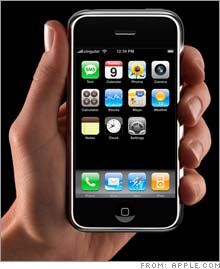Looking beyond the iPhoneYes, Apple's latest toy is seductive. But the iPhone does not represent the future of music. Fortune's David Kirkpatrick introduces the jukebox in the sky - RealNetworks' Rhapsody.NEW YORK (Fortune) -- I tried to resist the giddiness with which the world greeted Apple's latest bauble this week. The iPhone will be expensive, it looks like it could break easily if dropped, it lacks the broadband wireless capability that other high-end data-phones routinely offer, it could be very hard to use while driving and even its name is being challenged by Cisco (Charts). But despite all that, it became apparent it will be a phenomenal hit, so I succumbed.  While the iPhone may be the phone of the future, to the degree that it is a music player, it is based on the ideas of the past. The iPhone is part iPod. The iPod, in turn, grew out of iTunes, the software that Apple (Charts) invented way back when, simply as a better way to play music on a computer. Then iTunes gave Apple's engineers the idea to build a device that allowed people to carry around their music, and iPod was born. The coup de grace was the iTunes Music Store which Apple launched in April 2003. It enables customers to purchase songs online directly from Apple - over two billion of them so far. One reason the iPhone makes sense for Apple is that it enables the iPod to evolve beyond iTunes. That's good, because iTunes represents a business model that will make increasingly less sense as time passes. We're entering an era of ubiquitous wireless broadband, where data will be available to us wherever we go. In that kind of world, we will not need iTunes. I doubt most people will want to buy or "own" music at all. It will be far more useful to pick from a giant online library and listen to whatever we want wherever we are. I didn't fully realize this until I got a loan of a home music system called Sonos. It's an elegant way to get music wirelessly from your PC to your stereo, but in its latest iteration it also is well-suited to getting your music directly from the Internet. The best way to get music into Sonos is via Rhapsody. Rhapsody, not iTunes, in my opinion, is the future of music. This service, offered by RealNetworks (Charts), is what Real's CEO Rob Glaser calls "the jukebox in the sky." Originally designed to be used on a PC, Rhapsody allows users anytime access to an Internet library of over three million songs, including most that have ever been commercially released in the United States. Rhapsody subscribers, who pay $10 a month for unlimited access, today listen to about 130 million songs per month. Using Rhapsody in my living room over the Sonos equipment was a revelation - it was now possible, on a whim, to listen to anything I wanted - whether it be an individual song (What was that great Waterboys hit again?) or an album (Sometimes I just want to go all the way back to high school and hear "Disraeli Gears"). It just streamed through the Internet. Rhapsody on Sonos shows what's possible. Now Rhapsody is heading to the wireless ether, as it should. At the CES show this week, Real and partners announced several new ways to get Rhapsody, including some that are wireless. Reigncom this spring will start selling an iRiver portable MP3 player that allows you to listen to a Rhapsody stream over Wi-Fi networks. Nokia's (Charts) pocket-sized N800 tablet computer will also be able to receive wireless Rhapsody starting in February. They won't allow you to listen everywhere, but if you can get a good wireless signal you'll get Rhapsody. When I spoke to Real's Glaser recently he predicted that for the ultimate jukebox in the sky, those of us in the United States will have to wait until 2010 or so. He assumes the entire country will by then have a ubiquitous wireless broadband grid using WiMax or something similar that will allow Internet data to flow everywhere like electricity. Such services may come sooner in other countries whose governments are more enlightened about telecommunications. Some countries, like Korea, already have wireless streaming music services. The iPhone's charms are many. I can't recall a newly-announced device that so many people say they want, from my 14-year-old daughter to my boss. The iPod has so penetrated the public mind, and there's such a consensus that cell phones generally suck, that there seems a kind of intuitive societal understanding of what Apple is offering us: better integration of the many electronic functions we want to carry around, in a uniquely well-designed package. (The best description I've seen of what makes iPhone so appealing is David Pogue's in the New York Times.) But for now the iPhone doesn't aspire to connect to the jukebox in the sky. Nor does iTunes include any ability to subscribe to music libraries, wirelessly or otherwise. RealNetworks is way ahead of Apple in navigating the complexities of licensing and software for a streaming music service. Maybe the two companies will somehow get together. Until they do, or Apple otherwise gets the music subscription religion, the iPhone won't be what it should be. _________________________________ |
Sponsors
| |||||||||||

